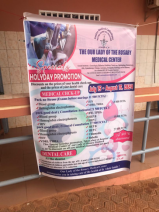Reproductive Health: Sisters Hospital Simbork Offering Consultations at Reduced Costs

In order to prevent various health issues associated with adolescent reproductive health, complications of pregnancy and childbirth, the Our Lady of the Rosary Medical Center Simbork is organizing a special holiday 20% discount on the prices of medical checkups from July 15 to August 15, 2024.
These discounts are divided into two groups;
Pack no Stress and pack good deal. Pack no stress has to do with Pre-marriage examinations that now cost 8000FCFA instead of the initial 11 500 FCFA. The various tests here include: HIV, Blood group, Haemoglobin electrophoresis and VDRI/THHA.
Pack good deal, concerning Antenatal consultation that initially costs 21 500 FCFC, now cost 15000 FCFA. The various tests here include; BW- TPHA, Blood group, HaemoglobinElectrophoresis, НЕРВ, HEPC and HIV.
pack good deal for Prenatal consultation will cost 27000FCFC instead of the initial 37 500 FCFA. The various tests of this category include; Blood group, HEPB, HEPC, Haemoglobin electrophoresis, Chlamydia, HIV, Rubella and VDRL/THHA.
This special festive day promotion takes place at the Medical Center of our Lady of Rosary Simbock Hospital 1 20% discount on all your medical examinations per pack.
The dental service on its part is offering a 25% discount on all consultations, that is 2000FCFA for every consultation. According to the coordinator of this hospital, Sister Carine Wanka, the promotion aims at enabling the population to all have access to healthcare.
Ingrid Kengne.
Reaction
“The aim of this campaign is to reduce the risks of starting a life and having the inconvenience of spending years unable to conceive, or having children who are poorly formed or too ill”
Sister Carine Wanka, coordinator of Our Lady of the Rosary Medical Center Simbork
We have young people who are on holiday, and when you say holiday you sometimes mean certain excesses. We have young people who really have the idea of getting together, who are thinking about the future, and who in the madness of youth have already started an active sex life. The aim of this campaign is to reduce the risks of getting involved with someone, starting a life and having the inconvenience of spending years unable to conceive or having a child and then not knowing why you don’t have another or having children who are poorly formed or too ill. The intention is to know one’s health, so before getting involved with X or Y, who is my partner, I need to know who I am, I also need to know who my partner is, perhaps there are irreversible things that will push us to change our decisions, such as knowing one’s haemoglobin electrophoresis.
The public may say that these are rare cases, but when it happens it’s terrible, to see someone who is AS get involved with someone who is AS, we know that it’s too much of a risk for the children who come. So it’s important to know, for example, what my electrophoresis is like. When I want to get together with someone it’s also important to know what their electrophoresis is, to take just one example. And for those who already have an active sex life, it would be good to know whether there are any diseases that I have contracted during this activity, so as not to contaminate my partner with whom I will be living, and even compromise my chances of fertility or the health of my children. So that’s what’s aimed at young people in particular.
Now, as far as pregnant women are concerned, we are fully aware that the health of the unborn child depends very much on the health of the mother and even the health of the couple. Since I’ve just talked about preparation by those who want to form a couple. A child, for example, who is going to be SS depends on the electrophoresis of its father and mother. So once the mother is already pregnant, there are also check-ups that need to be carried out in anticipation of the child to come. We take viral diseases such as HIV and hepatitis, especially hepatitis B and C. We know very well that a mother who has these illnesses can easily pass them on to her children, including HIV. However, if a mother has the same illnesses and knows about them in advance, all the necessary arrangements will be made; we have already planned all the good attitudes to be adopted by the couple to avoid mother-child transmission; but if a mother is unaware of this, she will necessarily pass it on to her child. We have illnesses in the mother that can be responsible for miscarriages, premature births, malformations in the child or illnesses that will start after birth and sometimes serious and burdensome illnesses, illnesses that cause serious disabilities in the child. A mother who hasn’t had her check-ups either because she thinks she’s used to giving birth normally in this way, so why bother myself! She runs the risk of passing these illnesses on to her children; for example, Rubella, Toxoplasmosis, you see these children either with small heads or large heads with spinal cord and bifida, with all kinds of illnesses that could have been avoided if the mother had been treated properly from the moment we knew she was ill. That’s why it’s important to encourage people to get themselves checked.
The habit that mothers have is to come and complain that the tests are expensive when we present to them the balance sheet they have to pay. They say that depending on my money I’m only going to do this or that. Unfortunately, we’re in a situation where it’s difficult for us to say that for a pregnancy we can be satisfied with doing just one test and then doing away with the rest, no, that’s not possible. We have a paediatrician who comes to see the children after birth and she says that the majority of these children who suffer from neonatal infections after birth are infections that could have been prevented if the mother’s health had been properly examined during pregnancy. And we know what it’s like to have to care for a sick newborn from birth. It’s excessively expensive in today’s context.
We see the ordeal in our families when we have to look for an incubator, when we have to spend a few days, a few weeks in a neonatal unit – all for what? For infections that could have been treated during pregnancy? If we had treated them, we wouldn’t have gotten to where we are. So it really is in the pregnant woman’s interest to understand the importance of having a check-up if she is to have a happy, carefree motherhood.
Reaction by Ingrid Kengne















